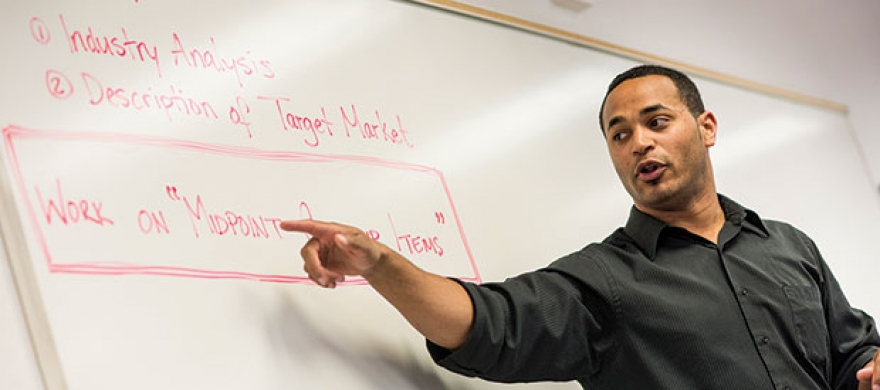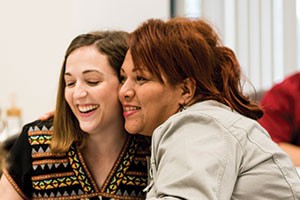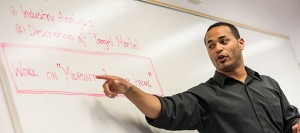Every Thursday at noon, first year law student Corey Miller and homeless shelter resident
Greg Williams, 47, meet on the Drescher Graduate Campus, in Malibu to talk business.
Through the University’s Microenterprise Program, Miller and other students are helping
Williams launch his company, Queenie’s Creole Pie.
“I spend most of my days in class or studying so to have this human experience and
help someone is so valuable,” Miller says. “Working with Greg has taught me so many
things.”
Student Whitney Merritt meets with client Sandra Carrington.
Through the program, undergraduate and graduate students from multiple disciplines
University-wide mentor disadvantaged entrepreneurs in establishing microbusinesses
or finding employment. The student-client teams meet over lunch to build clients’
confidence, focus their business ideas, create business plans, and carry them out.
To propel their fledgling businesses forward, clients complete weekly assignments
including researching target markets, and conducting industry and competition analysis.
“To be able to impact people’s lives is a game changer and an experiential education
opportunity for students and for how they live their lives after they graduate,” says
Doug Pak, program boardmember, and CEO of BLD Brands, in Orange County.
A Pepperdine shuttle picks clients up at Union Station, in downtown Los Angeles each
week to bring them to campus. Clients review homework with student teams and are assigned
new goals. After students leave, clients attend classes to learn basic principles
of financial management, business planning, and accountability, led by faculty and
Pepperdine alumni.
The cohort begins in August and concludes with April graduation. During the summer,
program leaders meet with shelter caseworkers to identify new candidates who have
shown an ability or desire to move forward in their lives, and are interested in entrepreneurship.
There is a lengthy application and interview process, run by director Larry Cox, Pepperdine
associate professor of entrepreneurship at the Graziadio School of Business and Management,
and by Keith Obilana (MBA ’13), Microenterprise Program manager. “We are trying to
help people who don’t have access to resources,” says Keith Obilana (‘13 ), Microenterprise
Program manager. “Many are just out of drug and alcohol rehab. Some have criminal
backgrounds so jobs are hard to obtain. Having students bring insight and wisdom is
helping these people rebuild their broken lives.”
Financial support has come from the University and board members. A Seaver Capstone
project involving business students is exploring crowdfunding as a revenue source
to help provide funding for clients to rent business space, or purchase equipment.
Banc of California recently made a multiyear financial commitment to the program,
for administrative costs like client transportation to campus, lunch, and supplies.
Microenterprise Program manager Keith Obilana leads the experiential education endeavor.
The endeavor was established in 2010 by Pepperdine law professors and students inspired
by Nobel Prize winner Muhammad Yunus, who pioneered microfinancing- the provision
of collateral-free loans of modest amounts to help the poor in developing countries
establish or grow small businesses. The Microenterprise Program was initially run
through the University’s Palmer Center for Entrepreneurship and the Law at the School
of Law.
“We realized that microfinancing in a developing country and microfinancing in a developed
country are very different. In a developing country, $200 can finance an entire company
but in a place like the U.S., it will barely get you through licenses and legal requirements,”
Obilana explains.
Successes include the launch of a full-time auto detailing company, as well as part-time
ventures in film production, welding, catering, and transportation. “We encourage
clients to look at their backgrounds and think about what skill set they have in coming
up with a business idea,” Obilana says.
Program leaders hope to make the endeavor a national model for other universities.
“We’ve gotten calls from schools and organizations all over the U.S. trying to replicate
our program,” says Janet Kerr, program founder and Pepperdine Professor of Law Emeritus.
Kerr serves on the board along with Pak, Howard Spunt, cofounder of Landmark Reality
and the owner of P32 Gallery, and Greg Ellena, former CEO of First National Bank of
Santa Fe.
THREE DREAMS IN PROGRESS
Queenie’s Creole Pie
The idea for Greg Williams’ pie business came to him as he slept in his jail cell
in 2009. In the dream, he was a child, back in Louisiana by his mother’s side helping
her cook traditional Creole recipes, including her beloved sweet potato pie. When
he awoke, he wrote down what he remembered of the recipe. “I didn’t have a parole
date yet. This was just an idea but it was something I should have been doing a long
time ago instead of the life decisions and choices I made,” Williams says.
After his 2013 prison release, Williams began recreating his mother’s pie. “My mom
had a very peculiar, secret blend of spices. The pie reminds me of being a little
kid at Christmas with no worries,” Williams explains.
He heard about the Microenterprise Program from a friend in church. “The program made
me see my potential and how the seed of an idea could grow with a little dedication,
hard work, and sacrifice,” Williams says.
Williams’ Microenterprise team is considering initially marketing directly to consumers
through farmers markets and street fairs, and then as the business grows, selling
wholesale to grocery stores or bakeries. Pricing strategies are being discussed with
attention paid to overhead costs.
“I’ve taken marketing classes but now I’m actually doing something real world,” says
Matt Bryson, a freshman international business major also working with Williams. “It’s
been a great experience, really eye-opening, and a lot of work.”
Williams baked several pies for a prototype and brought them to class. They were quickly
consumed and at Obilana’s request, Williams will bake a dozen pies for the Microenterprise
graduation where potential investors will be in attendance.
Open Doors
Full time MBA student Whitney Merritt is helping single mom Sandra Carrington, 47,
who escaped an abusive relationship and recently moved with her teenage daughter to
low-income housing. Carrington’s business idea, Open Doors, helps military veterans
find housing. Carrington, a veteran herself, came to the program with multiple ideas.
The team helped her narrow her focus to a realistic business plan that could eventually
expand in other directions. Merritt is finding great value in partnering with two
law students to help clients. “Law students are coming from a different perspective,
so I am learning as well,” Merritt explains.
Through the team’s guidance, Carrington registered her business, conducted a competitive
analysis, and created a logo and brochure. “Sandra has taken her background and found
a niche,” Merritt explains.
Carrington recently found rental homes for two veterans and their families. “The students
motivate me a lot. I’m really learning how to make the business run,” Carrington explains.
“The homework we have is the research we need to do for the business.”
Carrington’s ultimate goal is build a homeless shelter to help others like her.
Eager to share her successes, Carrington smiles and says, “I’m going to write a book.
I want my student team to be available to tell about this story,” Carrington says,
smiling. “I’m going to write a book. Instead of it being painful I want this experience
to help others.”
One One 80
Tomasa Pereira, 35, immigrated from El Salvador when she was 19 to join her mother
who had immigrated to the U.S. when Pereira was six years old. Pereira has struggled
financially trying to pursue a career in the fashion industry. Her Microenterprise
team is helping her launch a 10 to 15 piece line of women’s clothing for summer that
includes dresses, tops, bottoms, and accessories in soft, plant-based fabrics using
trendy seasonal colors, and comfortable fits. Her business name, One One 80, is her
birthday.
“Friends and family kept asking me to make special pieces for them, so I created my
own logo and labels,” Pereira explains. “I have the talent to make the product but
not the knowledge to create a business. This program is guiding me in making it happen.”
Tess Sadowsky, a first year law student, is helping Pereira create a business plan,
a resume, cover letter, and website to showcase the designs. One of the biggest challenges
the team is working on is tracking the time required to design, market and sell a
line of clothing in order to set realistic and measurable goals. Other goals include
a photo-shoot, an online store, crafting of a presentation of Pereira’s designs to
bring to boutiques.
Sadowsky believes that Pereira has the product and drive to be successful. Pereira
was raised by strong immigrant matriarchs and infuses that confidence into her brand
of clothing. “I’m really impressed by Tomasa’s ability to explain her product using
her personal experience, and her passion for what she loves about fashion,” Sadowsky
says. “That will help make her business successful.”
Sadowsky especially enjoys leaving behind the intensity of her law studies to support
Pereira. “When I heard about this program during my first week of law school, I couldn’t
believe it. Being able to share our resources with the outside world is such a great
opportunity to learn,” Sadowsky says.
Hear directly from the Microenterprise teams about their collaboration.


